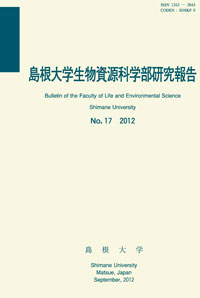島根大学生物資源科学部
ISSN:2435-0885(オンライン)
ISSN:1343-3644(冊子体)
なお、冊子体の刊行は23巻まで
ISSN:1343-3644(冊子体)
なお、冊子体の刊行は23巻まで

ダウンロード数 : ? 件
この文献の参照には次のURLをご利用ください : https://ir.lib.shimane-u.ac.jp/5112
島根大学生物資源科学部研究報告 8
2003-12-20 発行
熱帯域における反芻家畜生産成績向上のための低品質粗飼料の飼料価値改善
Improvement of Feeding Value of Low Quality Roughages to Enhance Ruminants Production in Tropical Regions
ファイル
内容記述(抄録等)
Four selected studies carried out to evaluate the utilization of rice straw based diet and poor quality forages with energy and protein supplements which are applicable to farmers in developing countries at farm level are presented. 1) Wethers fed on rice straw ad libitum supplemented with soybean meal (SBM) at the rate of 75 and 150 g/d to supply 50 to 100% of maintenance level of the metabolizable protein. Supplementation of SBM resulted in higher feed intake and digestibility through the effect on rumen fermentation status, although there was no further effect on nitrogen (N) retention at increased level of SBM supplement. It was considered that high fermentable energy is required to support optimum activity of the rumen microbes at the high protein supplementation. 2) The effects of protein and energy supplementation with straw diet on N retention and rumen microbial yield (MBY) were studied using wethers. The three rations, 100% ammoniated rice straw (ARS), 65% untreated rice straw (URS) + 30% rice bran (RB) + 5% SBM, and 85% ARS + 15% RB, were formulated to contain almost the same amount of protein and energy. RB + ARS improved N retention and MBY, but RB + SBM supplementation with URS showed similar response on N utilization and efficiency of MBY compared to ARS based diet. 3) Voluntary intake, digestibility and live weight gain were evaluated in yearling goats fed on Rhodes grass hay ad libitum, and supplemented dried Gliricidia leaf meal (GLM), GLM and maize bran (1:1), and maize bran at the rate of 120g/d. Feed intakes and the digestibility of organic matter (OM) and N were greater for supplemented groups than for control. The live weight gains were the highest in goats supplemented with mixture of GLM + maize bran. The result indicated that GLM could be used as a source of supplement for growing ruminants fed on low quality hay. 4) To evaluate the effect of supplementing legume tree leaf on intake, digestibility, live weight gain and MBY, two experiments were conducted using 20 crossbred steers offered fresh napier grass ad libitum. Gliricidia supplementation slightly decreased napier grass intake, although Leucaena increased the total feed intake without depressing napier grass intake. There were no clear effects of supplementing Gliricidia and Leucaena on OM digestibility, MBY and its efficiency. Live weight gain was obviously greater in Leucaena supplemented group than in Gliricidia group.
About This Article
Other Article
PP. 23 - 27
